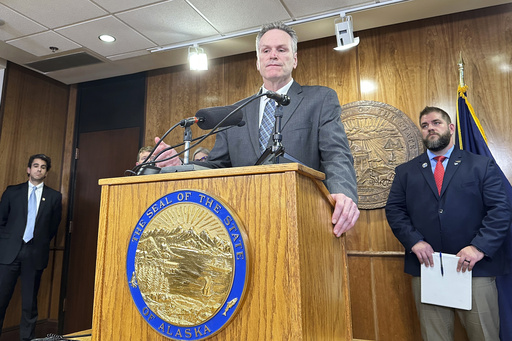
JUNEAU, Alaska — Governor Mike Dunleavy of Alaska has presented a list of priorities to the incoming Trump administration, which encompasses the expansion of oil and gas exploration in the unspoiled Arctic National Wildlife Refuge and the lifting of restrictions on logging and road construction in temperate rainforests that serve as vital habitats for species including wolves, bears, and salmon.
Dunleavy has urged President-elect Donald Trump to issue a specific executive order aimed at initiating “critical agency actions that would restore opportunity to Alaska.” The Governor, along with other Republican leaders in the state, is optimistic about Trump’s return to the presidency and believes he will be more supportive of resource development, such as oil, gas, and minerals, compared to the current administration.
Alaska has consistently challenged what it views as federal overreach, particularly regarding policies that obstruct the development of its extensive natural resources. In a letter to Trump dated November 15, which was publicly released this week, Dunleavy outlined his requests. He is advocating for the establishment of a Cabinet-level task force to coordinate efforts between agencies like the Interior Department and Environmental Protection Agency to achieve Alaska-specific policy objectives under Trump.
The policies concerning these matters have often changed dramatically with each federal administration, leading to numerous court battles. For instance, the ongoing debate about policies regarding the Tongass National Forest in southeast Alaska has fluctuated since the Clinton administration.
Bridget Psarianos, an attorney with Trustees for Alaska — which has been involved in legal efforts to protect the refuge and similar areas — commented that many topics on Dunleavy’s agenda are longstanding issues for her organization. “We’re preparing to continue to hold the line,” she stated, emphasizing that they will watch closely for any attempts to cut corners or hasten projects, including drilling in the refuge.
Furthermore, Trustees for Alaska is involved in a lawsuit contesting the Biden administration’s approval of the Willow oil project within the National Petroleum Reserve-Alaska. While the Willow project may align with some of Dunleavy’s objectives, the Biden administration’s 2023 approval included restrictions on drilling in other regions of the reserve, which Dunleavy criticized as unacceptable.
Biden, during his campaign, was against drilling in the Arctic National Wildlife Refuge and initiated a review of the leasing program shortly after taking office, which resulted in the cancellation of seven leases from a sale conducted under Trump. A law enacted in 2017, promoted by Trump, mandates two lease sales in the refuge’s coastal plain to occur before late 2024. The second sale, announced recently, is scheduled for January 9, shortly prior to Biden’s departure from office. However, the amount of land available for bidding is significantly reduced compared to the first sale, prompting Dunleavy and Alaska’s Republican senators to condemn this as insufficient and disrespectful to the legislation.
In a recent interview, Dunleavy expressed his conviction that the transition away from fossil fuels is largely unfeasible due to the rapidly growing energy demand. “There are very few experts who believe it can be done without fossil fuels,” he remarked.
While he supports the expansion of renewable energy, he also advocates for the continued development of traditional energy sectors like oil, gas, and coal, especially if carbon capture can be utilized effectively. Dunleavy envisions carbon offsetting and underground storage initiatives as a means for Alaska to diversify its revenue streams while still advancing its natural resources and without implementing new taxes.
